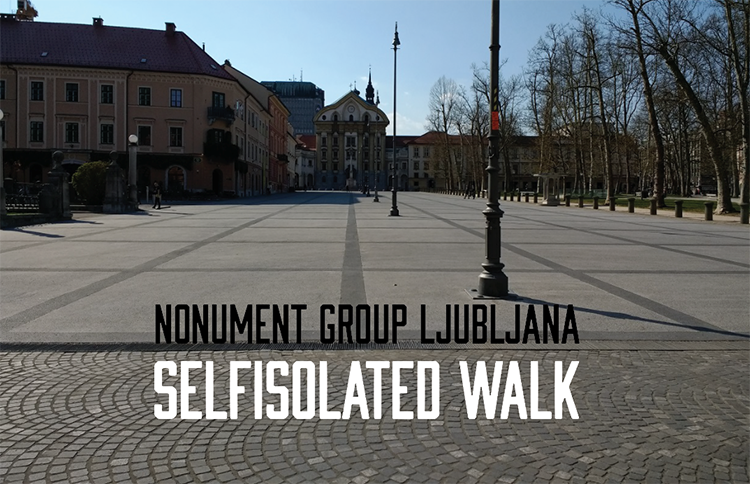
Walking together during self-isolation
– from Nonument Group, Ljubljana, 21.07.2020
In times of the shutdown due to Covid-19 epidemic, collectivity had to be reinvented. In early March, Nonument Group planned a series of discursive guided walks that were to explore some of the most notorious ruins, halted construction sites and abandoned complexes – radically recontextualised structures we term »nonuments« – in the Slovene capital of Ljubljana. Overnight, the whole city became radically recontextualised. Public institutions closed. The public sphere evacuated the public space and moved online. Walking through the city centre, the feeling was that the whole city became a nonument. But how to explore possibly the most radical reconfiguring of the city in the living memory, and, even more importantly, how to sustain an open discourse about it under the conditions of self-isolation?
In response to these questions, Nonument Group created a self-guided audio walk with a title »Tourist traps of Ljubljana in the time of Coronavirus.« Participants can download it as a simple app and take a walk: our thoughts and questions on the changed urban condition are played whenever the participant walks into the respective area. Instead of visiting the least known places usually out of sight and mind, we shifted our attention to the sights that were only recently the most visited ones both by tourists and locals – in other worlds, places where the difference in urban pulse was most pronounced. A city in shutdown is neither a remnant of the past nor a sign of the future. Rather, it is a diagnostic field: a suspension of everyday that shifts things usually not visible into focus. In reduced numbers, people are still here, as is the traffic and the economy. But moving through the city in the time of quarantine measures means focusing our attention to everything that isn’t there – habits that have been suspended, functions that have been cancelled, and crowds that have disappeared. In exploring the city during the shutdown, we can learn much about the city as it used to be, and also about the city it might become once the quarantine is lifted and the pandemic defeated. Will tourism, economy, real estate, art and public life ever be the same? Mark Twain once said that no word was ever as effective as a rightly timed pause. Our walk is designed as an inspection and an open-ended collective exercise in registering such a pause, addressing both the locals and the future visitors that might want to experience the city they didn’t have the opportunity to at the time, and welcoming feedback based on the thoughts our walk triggers. It is a dialogue adapted to the new conditions. The time of epidemic measures offers us the ability to think about the world in limbo – are we still looking forward to return to the way things were before the pandemic? Or are there perhaps different tasks that await us, among them rewriting some of the basic rules of the society? In order to think about what are the types of changes we most urgently need after the coronavirus crisis is over, we must start observing and contemplating our cities here and now: during the shutdown and in the midst of the crisis itself, not with isolating but with creating a different sort of collectivity.
POST(COVID)CARDS
